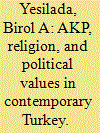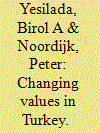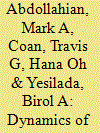|
|
|
Sort Order |
|
|
|
Items / Page
|
|
|
|
|
|
|
| Srl | Item |
| 1 |
ID:
190813


|
|
|
|
|
| Summary/Abstract |
The Justice and Development Party (AKP) came to power in 2002 with the promise of reforms to further democratic consolidation in Turkey. At that time, the AKP represented a rainbow coalition of individuals from the previous Islamist parties and many liberal democrats who were fed up with the failures of old secular political parties. The Turkish public shared their frustrations and overwhelmingly supported the AKP. Unfortunately, these reforms did not last. Today, it is indisputable that under the rule of the AKP, and more specifically, President Recep T. Erdoğan, Turkey has become an authoritarian state defined and shaped by one person. This article explores what these developments mean for the future of Turkish democracy as the country celebrates its centenary, and it includes an examination of whether Turkish political culture is supportive of such changes.
|
|
|
|
|
|
|
|
|
|
|
|
|
|
|
|
| 2 |
ID:
095676


|
|
|
|
|
| Publication |
2010.
|
| Summary/Abstract |
Using data from the World Values Surveys, this study examines changing values in Turkey and shows that rising religiosity and intolerance can be traced back to 1995 and have become more visible during the AKP's rule. Moreover, Turks are found to be the most religious of all the societies compared in the study. Findings suggest that Turkish voters are likely to continue being attracted to political parties like the AKP in the future, which would have important implications for Turkey's relations with its traditional friends in the West.
|
|
|
|
|
|
|
|
|
|
|
|
|
|
|
|
| 3 |
ID:
118183


|
|
|
|
|
| Publication |
2012.
|
| Summary/Abstract |
The relationship between economic development, cultural change, and political liberalization is often explored through the lens of classic modernization theory. Recent scholarship attempts to extend classic theory to be more closely aligned with empirical reality. Under the human development perspective, economic prosperity acts as a catalyst for cultural development, leading to social values that favor liberalization, and thus promotes effective democracy. Using a systems dynamic approach, we formalize the dynamic causal structure specified in the human development perspective, develop a novel econometric procedure (Genetic Algorithm Nonlinear Least Squares) to estimate the parameters of highly nonlinear, continuous time models, and verify our formal model using five waves of data from the World Values Survey. Our results indicate that development is strongly nonlinear and path dependent: Economic progress is a necessary condition for successful secularization and expressive political behavior, which are antecedents for lasting democratic institutions. Thus, policies and institutional arrangements must be tailored to, not outpace, a nation's level of economic progress to create demand for a secular and expressive political marketplace where democratic institutions can sustain and thrive.
|
|
|
|
|
|
|
|
|
|
|
|
|
|
|
|
|
|
|
|
|